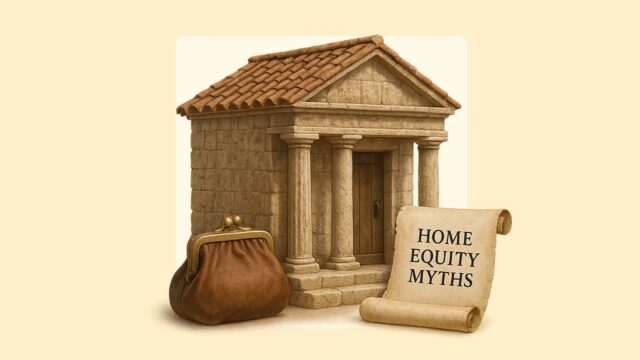
Home equity sounds like a pretty straightforward concept: it’s the portion of your home you truly own, free and clear of debt. However, when it comes to understanding concepts like how home equity grows, the differences between home equity products, or how much equity you can borrow against – people can get a lot of things wrong.
As a Certified HELOC Specialist, I often field many questions from confused homeowners on everything about home equity, including what it is, how to tap into your home’s value, how that may impact your primary mortgage and more. A quick scroll through social media or online forums reveals a lot of misinformation out there. To help cut through the noise, I’m using this Bankrate column to dispel nine myths and misconceptions about home equity and home equity borrowing – revealing the truth that every homeowner needs to know.
1. Misconception: home equity = home value
Just because the value of your home is $500,000 doesn’t mean you have $500,000 in equity.Home equity is based on your home’s worth, but it’s not the same thing. To figure out your home equity, you have to subtract your mortgage balance from the appraised value of your home. So, if your home is valued at $500,000, but you still owe $350,000, your equity stake is $150,000. Understanding this distinction is important, especially if you’re considering borrowing against your equity or selling your home.
2. Myth: Home equity always grows over time
Since the COVID pandemic, home prices and homeowner equity levels have soared to record highs. Some people assume that both will keep climbing — but as anyone who owned a home in 2008 can tell you, that’s not always the case. Residential real estate values declined drastically during the Great Recession. In fact, millions of homeowners found themselves in negative equity: owing more on their mortgages than their homes were worth.
Markets fluctuate and if home prices drop, so can your equity. Take what we’re seeing in 2025. The median home prices hit an all-time high of $422,800 in May 2025, and the average mortgage-holding homeowner has $302,000 in accumulated home equity as of the first quarter of this year, according to Cotality. But the pace of home price growth is slowing. And as home price appreciation slows, so do equity stakes. In fact, that $302,000 represents a loss of more than $4,000 in equity over the past year.
3. Myth: It takes years to build equity in your home
Not always. True, when you take out a mortgage, your home equity builds slowly at first as the early payments mostly cover your loan’s interest. As time passes, a greater portion of the payment goes to principal, speeding up equity growth. This process is known as mortgage amortization.But not all paths to home equity growth involve the long game of paying down your mortgage. You can gain immediate equity by making a larger down payment or paying closing costs upfront instead of rolling them into the mortgage when you buy a home.
Additionally, making extra payments towards your loan’s principal can help you increase your housing stake faster. Home renovations can also boost your property value and, in turn, your equity. But remember, not all renovations offer the same return on investment (ROI). Some improvements, like kitchen or bathroom upgrades, tend to have a higher ROI than others.
4. Misconception: HELOCs and home equity loans are the same
I’ve often heard the terms HELOCs (home equity lines of credit) and home equity loans used interchangeably when describing home equity borrowing. Yes, both are financing products that allow you to borrow against your home’s value. Both also use your home as collateral, meaning you could lose it if you don’t make payments on either of them. That’s where most of the similarities end.
A home equity loan gives you a lump sum at a fixed rate, keeping your payments stable for the life of the loan. In contrast, a HELOC is a revolving line of credit with a variable rate, meaning your monthly payments may fluctuate based on the amount you borrow and market conditions.
The other differences? With a home equity loan, the interest is applied to the entire loan amount, but with a HELOC, interest is only charged on withdrawn funds. Mixing up the two and not fully understanding the differences can lead to some expensive surprises down the road.
5. Misconception: Home equity financing is always cheap
It’s true that home equity loans and HELOCs often come with lower rates than personal loans or credit cards. But we must not confuse “lower” with “low.” In today’s higher interest rate environment, they’re not always the deal they once were. For example, as of July 2, HELOC rates were averaging just over 8.25 percent, and some ran as high as 12.50 percent, according to Bankrate’s national survey of lenders. Home equity loan rates were similar, running as high as 10.47 percent.
The exact rate you are offered depends on several factors, including the lender, the loan type, your credit score and even where you live. Some advertised rates also include discounts if you sign up for automatic payments or have a checking account with that lender.
Disclaimer
Artificial Intelligence Disclosure & Legal Disclaimer
AI Content Policy.
To provide our readers with timely and comprehensive coverage, South Florida Reporter uses artificial intelligence (AI) to assist in producing certain articles and visual content.
Articles: AI may be used to assist in research, structural drafting, or data analysis. All AI-assisted text is reviewed and edited by our team to ensure accuracy and adherence to our editorial standards.
Images: Any imagery generated or significantly altered by AI is clearly marked with a disclaimer or watermark to distinguish it from traditional photography or editorial illustrations.
General Disclaimer
The information contained in South Florida Reporter is for general information purposes only.
South Florida Reporter assumes no responsibility for errors or omissions in the contents of the Service. In no event shall South Florida Reporter be liable for any special, direct, indirect, consequential, or incidental damages or any damages whatsoever, whether in an action of contract, negligence or other tort, arising out of or in connection with the use of the Service or the contents of the Service.
The Company reserves the right to make additions, deletions, or modifications to the contents of the Service at any time without prior notice. The Company does not warrant that the Service is free of viruses or other harmful components.












